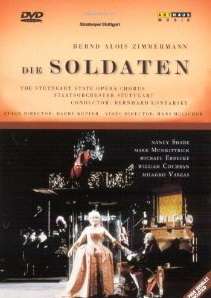|
Back
12/15/2011
Bernd Alois Zimmermann: Die Soldaten
Mark Munkittrick (Wesener), Nancy Shade (Marie), Milagro Vargas (Charlotte), Grace Hoffman (Wesener’s Mother), Michael Ebbecke (Stolzius), Elsie Maurer (Stolzius’ Mother), Alois Treml (Obrist), William Cochran (Desportes), Gregor Brodocz (A Young Gamekeeper), Guy Renard (Pirzel), Karl-Friedrich Dürr (Eisenhardt), Klaus Hirte (Haudy), RaymondWolansky (Mary), Johannes Eidloth, Robert Wörle, Hemut Holzapfel (Three Young Officers), Ursula Koszut (The Comtesse de la Roche), Jerrold Van Der Schaaf (The Young Count), Karina Schnabel-Hudec (An Andalusian Waitress),
The Stuttgart State Opera Chorus (Ulrich Eistert (Chorus Master), The Staatsorchester Stuttgart, Bernhard Kontarsky (Conductor), Harry Kupfer (Direction), Klaus-Peter Kehr (Dramaturgy), Wolf Münzner (Sets and costumes), Kurt Wogatzke (Lights), Bertrand Perreau (Choreography), Hans Hulscher (Video director)
Filmed at the Stuttgart Staatsoper (1989) – 111’
ARTHAUS MUSIK Ref. #: 100270 – Sound format: PCM Stereo – Picture format: 4:3 – Region code: 2, 5 – Subtitles in English, German, French, & Spanish – Libretto in German, French, & English

   
At the time of its composition Die Soldaten was so avant-garde that the Cologne Opera which had commissioned the work in 1958 declared it unplayable. Ultimately, after several revisions and orchestral simplification, the opera premiered in 1965. With Berg’s Wozzeck (1925), Zimmermann’s magnum opus is one the major works of the twentieth century repertoire. Due to its complexity at every level, Die Soldaten is an ambitious undertaking. No wonder it has intimidated many a director and has only been staged sporadically.
Dramatically, with an intricate narrative in which past, present, and future overlap, the story depicts the tyranny of power, the mindlessness of violence and how it destroys innocence, here portrayed by Marie, a victim of sexual abuse living out her last days on the streets, homeless, as a prostitute.
From a visual standpoint, Harry Kupfer’s direction is powerful and gripping. Combining the atmosphere of 18th century costume drama (the libretto, by the composer himself, is based on a 1776 play by Jakob Michael Reinhold Lenz) with modern direction and visual aids (such as film), this production effectively conveys Zimmerman’s gloomy reflections on human woe and despair. The stage, often kept in the dark, is divided in two levels with, occasionally, scenes running simultaneously.
The twenty-one-member cast unfailingly embrace the ungrateful vocal line and the unorthodox demands made upon them. They produce nice sounds – whenever they are able to – but more importantly they entirely inhabit the piece, slowly drawing the spectator into the fate of the characters. Stockhausen disciple Bernhard Kontarsky travels through the eclecticism of the score with imperturbable authority, giving this apparently disconcerting musical language – and its total lack of melody – striking transparency.
As one can easily imagine, recordings of Die Soldaten do not abound. A CD that amounts to a soundtrack of the same Stuttgart production is also available, as is a taping of the Cologne’s premiere in 1965 headed by conductor Michael Gielen (Wergo Germany), and a DVD of the 2006 production of the RuhrTriennale Festival (Germany) directed by David Pountney and conducted by Steven Sloane.
This is an amazing opera brilliantly served by a remarkable, historical production.
Christian Dalzon
|